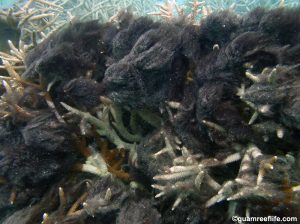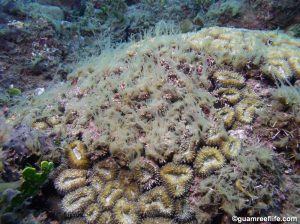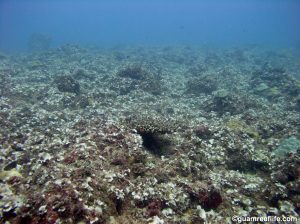The overgrowth of corals and other benthic organisms by algae – mainly by cyanobacteria and fleshy, erect macroalgae – can injure or even kill the affected organisms. Algae can harm corals in several ways: directly by abrasion and chemical means, and indirectly through the release of accumulated sediments and the transference of pathogens (i.e., disease-causing microorganisms). Another indirect means by which algae can inhibit coral growth is simply by covering over what would otherwise be suitable substrate for coral settlement. Corals and algae are natural competitors for space, but an over-abundance of algae can inhibit coral settlement, and thus can be detrimental to reef recovery.
Algae are a natural component of coral reefs, but as we’ve seen with other reef stressors, the multiple impacts of humans on water quality, water temperature, and reef fish populations can cause something native and natural to become harmful to the long-term vitality of reefs. The over-abundance of algae, and the resulting impacts on corals and other benthic organisms, may be influenced by one or more possible factors, but such factors are sometimes difficult to tease apart, especially when we know relatively little about the natural, seasonal differences in the abundances of various algae species.
Some factors known to influence algal abundance include the introduction of excess nutrients to nearshore waters through stormwater runoff and riverine discharge, as well as a reduction in algae-eating reef fishes. Another possible factor may simply be the large-scale loss of living coral through acute disturbances such as coral bleaching events or crown of thorns outbreaks. It has been suggested that even in areas with relatively little nutrient input and with relatively healthy reef fish populations, the rapid loss of a large amount of coral and the subsequent colonization of available substrate by algae may simply overwhelm natural means of keeping substrate suitable for coral settlement; the algae take over and the growth of the reef slows or even ceases.
The transition from a coral-dominated to an algae-dominated reef (or vice versa) is referred to as a “phase-shift.” Once a reef has phase-shifted, it is generally held that reversal is very difficult, especially within a time frame relevant to human populations dependent on coral reef resources.



